#Salesforce cloud storage
Explore tagged Tumblr posts
Text
#salesforce integration#Salesforce cloud storage#Salesforce folder management#Salesforce file management#Salesforce external storage integration
0 notes
Text
Embracing AI for Document Management in Salesforce: MyDocify's Game-Changing Features
Salesforce is an integral platform for managing customer relationships and business processes. Document management plays a critical role within Salesforce by storing, organizing, and retrieving essential data, including contracts, proposals, and client information. Efficient document management ensures that teams can access accurate information swiftly, streamlining sales and customer service processes.
The evolution of AI in document management system software marks a significant shift from manual, time-consuming processes to intelligent, automated solutions. Traditionally, document handling involved manual data entry, storage, and retrieval, leading to inefficiencies and errors. However, AI-driven technologies have revolutionized this landscape by automating tasks, enhancing accuracy, and optimizing workflows. The integration of AI in document management systems has brought about increased efficiency, improved data accuracy, and better decision-making.
The Need for AI in Salesforce Document Management: Challenges Faced by Salesforce Users: Salesforce users grapple with multifaceted challenges in managing documents within their ecosystem. These obstacles often involve the daunting task of organizing extensive data repositories, engrossing manual data entry processes prone to errors, limited collaboration tools, and inefficient document tracking and management systems. The cumulative effect of these challenges results in hampered productivity, compromised data accuracy, and impediments in sustaining efficient customer relationship management (CRM).
Advantages of Integrating AI in Document Management The integration of Artificial Intelligence (AI) into Salesforce document management systems yields an array of compelling advantages. AI-powered solutions serve to automate repetitive tasks, such as mundane data entry and meticulous document tagging, thereby conserving substantial time and significantly reducing errors. Furthermore, the inclusion of AI augments search functionalities, facilitating swift and precise document retrieval within the Salesforce platform. This integration not only bolsters collaboration but also introduces predictive analytics capabilities and reinforces document security measures, fortifying the overall efficiency and reliability of document management within Salesforce.
Exploring MyDocify's AI-Enabled Features: Overview of MyDocify MyDocify is a cutting-edge document management system seamlessly integrated with Salesforce. It harnesses the power of AI to offer advanced features tailored for efficient document handling. With MyDocify, users can access a comprehensive suite of tools designed to streamline document management workflows, enhance productivity, and ensure data security.
Key Features: AI Analysis, Simplified Sharing, eSignature, and more At its core, MyDocify integrates AI Analysis, a powerful tool that extracts invaluable insights and information from documents, enabling users to access crucial data swiftly and effortlessly. This feature enhances decision-making processes by transforming unstructured data into actionable intelligence.
The platform's Simplified Sharing feature fosters seamless collaboration among teams, both internally and externally. It enables users to share and access documents effortlessly while maintaining strict control over document access, ensuring data confidentiality.
Moreover, the eSignature functionality within MyDocify ensures secure and hassle-free document signing processes, allowing users to obtain signatures promptly and track document statuses efficiently. Alongside these core features, MyDocify offers additional capabilities such as Auto Categorization, enabling automatic categorization of documents based on user-defined rules, and an advanced Search function that allows users to find specific documents swiftly through various search parameters.
MyDocify's Advanced Security measures, including robust encryption protocols, bolster the platform's credibility in maintaining data integrity and security. By amalgamating these diverse features and functionalities, MyDocify epitomizes a comprehensive document management solution tailored specifically for Salesforce users, optimizing their document-handling workflows while ensuring efficiency, security, and ease of use.
Benefits of AI in Document Management for Salesforce: Improved Efficiency and Productivity: By automating repetitive tasks, AI enhances efficiency, enabling Salesforce users to focus on high-value activities. MyDocify's AI Analysis and Search functionalities expedite document retrieval, saving time and boosting productivity. Additionally, streamlined workflows and simplified collaboration tools contribute to increased efficiency.
Enhanced Security and Compliance Measures: AI-driven document management solutions prioritize data security. MyDocify's Advanced Security features, such as encryption and access controls, ensure that sensitive information remains protected. Compliance with industry standards and regulations is also facilitated, mitigating risks associated with data breaches or non-compliance.
Streamlined Workflows and Collaboration: AI-enabled document management simplifies workflows by providing tools for easy sharing, collaboration, and version control. MyDocify's Simplified Sharing feature fosters seamless collaboration among teams, clients, and partners. This ensures real-time updates, reduces errors, and accelerates decision-making processes within Salesforce.
Implementation and Adoption Strategies: Best Practices for Leveraging AI-Enabled Document Management Implementing AI in Salesforce document management requires careful planning and execution. Strategies include comprehensive user training for seamless adoption, effective change management to align with organizational goals, and continuous evaluation of system performance. Ensuring user buy-in and defining clear objectives are crucial for successful implementation.
Future Prospects: The Future Trajectory of AI in Document Management for Salesforce The future of AI in Salesforce document management holds promising advancements. Predictive analytics, natural language processing (NLP), and continued integration with other Salesforce features are anticipated. These developments will further enhance efficiency, accuracy, and user experience within document management systems.
Final Thoughts: Embracing Artificial Intelligence (AI) in document management is a pivotal step for Salesforce users seeking streamlined operations, amplified productivity, and enhanced data accuracy. MyDocify stands as a powerful solution offering AI-driven functionalities that redefine document management within Salesforce.
With its robust integration of AI, MyDocify adeptly tackles challenges inherent in document management, significantly boosting operational efficiency, and improving overall user experiences. This comprehensive suite of AI-powered tools ensures secure, efficient, and collaborative document handling, making MyDocify an indispensable asset for contemporary businesses operating within the Salesforce ecosystem.
#salesforce#document management software#file sharing software#Salesforce Document Management#Cloud Storage Solutions#salesforce storage solution#Salesforce file storage software#file storage salesforce#Document Management Solution#Document Solutions for SF CRM#Document Management in Salesforce#Salesforce document management App#Salesforce CMS#Document management system#Salesforce documents management#document management system open source#cloud based storage#document control system#best document management software#document management system software#salesforce document management system#salesforce document storage
0 notes
Text
2024 team sponsors recap!
this is completely irrelevant to F1 but i study and do these stuffs for a living sooo 😩😩 2023 sponsors are based on the sponsors that are there at the beginning of the season (new sponsors that join in the middle of the season will be classified as 2024's)
Mercedes AMG Petronas F1 Team:
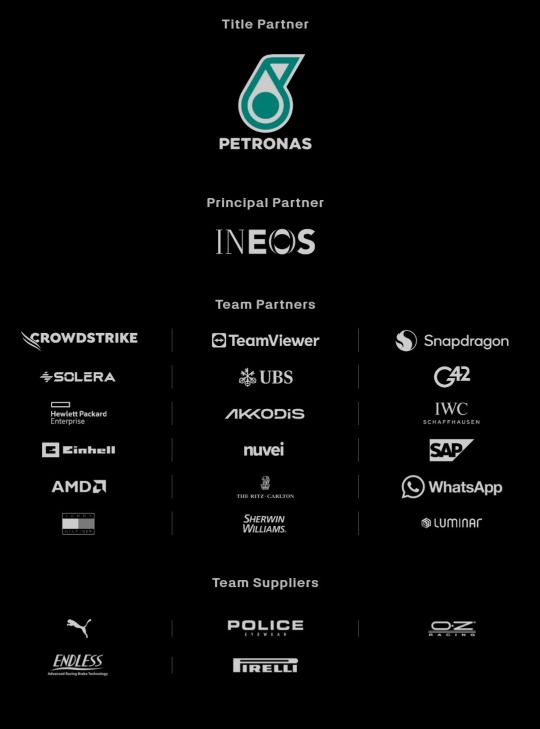
New sponsors: Whatsapp, Luminar (American tech company), SAP (German software company), nuvei (Canadian credit card services), Sherwin Williams (American painting company) 2024 data last update: 2024/02/14
Old sponsors that left: Monster Energy, Pure Storage (American technology company), fastly (American cloud computing services), Axalta (American painting company), Eight sleep (American mattresses company) 2023 data last update: 2023/01/07
Oracle Red Bull Racing F1 Team:

New sponsors: Yeti (American cooler manufacturer, joined later in 2023), APL (American footwear/athletic apparel manufacturer, joined later in 2023), CDW (American IT company, joined later in 2023), Sui (American tech app by Mysten Labs, joined later in 2023), Patron Tequila (Mexican alcoholic beverages company, joined later in 2023) 2024 data last update: 2024/02/15
Old sponsors that left: CashApp, Walmart, Therabody (American wellness technology company), Ocean Bottle (Norwegian reusable bottle manufacturer), PokerStars (Costa Rican gambling site), Alpha Tauri (? no info if they're official partners or not but Austrian clothing company made by Red Bull), BMC (Switzerland bicycle/cycling manufacturer), Esso (American fuel company, subsidiary of ExxonMobil), Hewlett Packard Enterprise (American technology company) 2023 data last update: 2023/03/07
More: Esso is a subsidiary of Mobil so there's possibility they merged or something
Scuderia Ferrari:

New sponsors: VGW Play (Australian tech game company, joined later in 2023), DXC Technology (American IT company, joined later in 2023), Peroni (Italian brewing company), Z Capital Group/ZCG (American private asset management/merchant bank company), Celsius (Swedish energy drink manufacturer) 2024 data last update: 2024/02/15
Old sponsors that left: Mission Winnow (American content lab by Phillip Morris International aka Marlboro), Estrella Garcia (Spanish alcoholic beverages manufacturer), Frecciarossa (Italian high speed train company) 2023 data last update: 2023/02/16
More: Mission Winnow is a part of Phillip Morris International. They are no longer listed as team sponsor but PMI is listed instead.
(starting here, 2023 data last update is 2023/02/23 and 2024 data last update is 2024/02/15)
McLaren F1 Team: (Only McLaren RACING's data is available idk if some of these are XE/FE team partners but anw..)
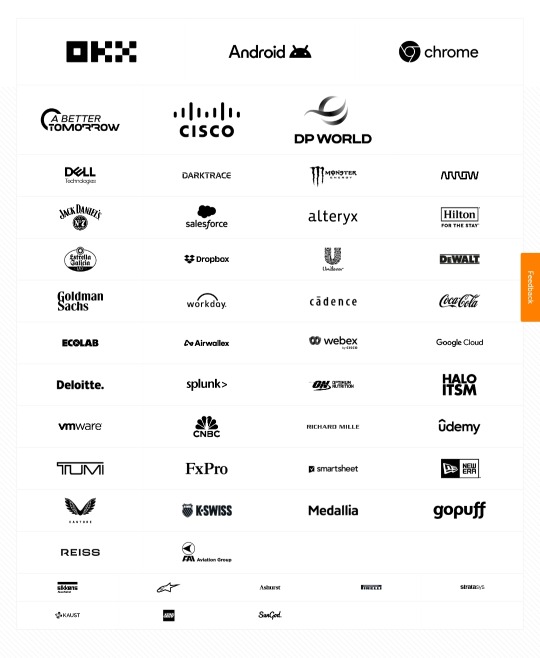
New sponsors: Monster Energy, Salesforce (American cloud based software company, joined later in 2023), Estrella Garcia (Spanish alcoholic beverages manufacturer), Dropbox (American file hosting company), Workday (American system software company, joined later in 2023), Ecolab (American water purification/hygiene company), Airwallex (Australian financial tech company), Optimum Nutrition (American nutritional supplement manufacturer), Halo ITSM (American software company, joined later in 2023), Udemy (American educational tech company, joined later in 2023), New Era (American cap manufacturer, joined in 2023), K-Swiss (American shoes manufacturer, joined later in 2023), Alpinestars (Italian motorsports safety equipment manufacturer)
Old sponsors that left: DP World (Emirati logistics company), EasyPost (American shipping API company), Immersive Labs (UK cybersecurity training company?), Logitech, Mind (UK mental health charity), PartyCasino (UK? online casino site), PartyPoker (American? gambling site), Sparco (Italian auto part & accessory manufacturer), Tezos (Switzerland crypto company)
Aston Martin Aramco F1 Team:

New sponsors: Valvoline (American retail automotives service company, joined later in 2023), NexGen (Canadian sustainable? fuel company), Banco Master (Brazilian digital banking platform, joined later in 2023), ServiceNow (American software company, joined later in 2023), Regent Seven Seas Cruise, Wolfgang Puck (Austrian-American chef and restaurant owner, joined later in 2023), Financial Times (British business newspaper), OMP (Italian racing safety equipment manufacturer), stichd (Netherlands fashion & apparel manufacturer)
Old sponsors that left: Alpinestars (Italian motorsports safety equipment manufacturer), crypto.com (Singaporean cryptocurrency company), ebb3 (UK? software company), Pelmark (UK fashion and apparel manufacturer), Peroni (Italian brewing company), Porto Seguro (Brazilian insurance company), Socios (Malta's blockchain-based platform), XP (Brazilian investment company)
Stake F1 Team (prev. Alfa Romeo):
???? Can't found their website (might be geoblocked in my country???)
BWT Alpine F1 Team:
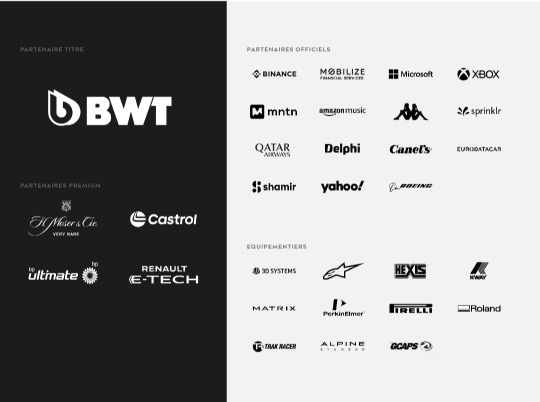
New sponsors: MNTN (American software company), H. Moser & Cie (Switzerland watch manufacturer), Amazon Music
Old sponsors that left: Bell & Ross (French watch company), Ecowatt (??? afaik French less-energy smthn smthn company), Elysium (French? American? Software company), KX (UK software company), Plug (American electrical equipment manufacturing company)
Visa CashApp RB F1 Team (prev. Scuderia Alpha Tauri):

New Sponsors: Visa, CashApp, Hugo Boss, Tudor, Neft Vodka (Austrian alcoholic beverages company), Piquadro (Italian luxury bag manufacturer)
Old sponsors that left: Buzz (?), Carl Friedrik (UK travel goods manufacturer), Flex Box (Hongkong? shipping containers manufacturer), GMG (Emirati global wellbeing company), RapidAPI (American API company)
Haas F1 Team:

New sponsors: New Era (American cap manufacturer, joined later in 2023)
Old sponsors that left: Hantec Markets (Hongkong capital markets company), OpenSea (American NFT/Crypto company)
Williams Racing:


New sponsors: Komatsu, MyProtein (British bodybuilding supplement), Kraken (American crypto company, joined later in 2023), VAST Data (American tech company), Ingenuity Commerce (UK e-commerce platform), Puma (joined later in 2023)
Old sponsors that left: Acronis (Swiss software company), Bremont (British watch manufacturer), Dtex Systems (American? cybersecurity company), Financial Times (British business newspaper), Jumeirah Hotels & Resorts, KX (UK software company), OMP (Italian racing safety equipment manufacturer), PPG (American painting manufacturer), Umbro (English sports equipment manufacturer), Zeiss (German opticals/optometrics manufacturing company)
#mercedes amg petronas#red bull racing#scuderia ferrari#visa cash app rb#haas f1 team#mclaren f1#aston martin#alpine f1#williams racing#stake f1 team#f1#ari's rant#sponsor talks
42 notes
·
View notes
Text
"Affordable Cloud Hosting in India: Why NetForChoice Stands Out"
In the rapidly evolving digital era, cloud hosting has become the backbone of businesses worldwide. Companies are moving away from traditional hosting solutions to embrace the flexibility, scalability, and affordability that cloud hosting provides. In India, NetForChoice has established itself as a leading name among managed cloud hosting providers, offering world-class services tailored to meet diverse business requirements.
This blog explores why NetForChoice stands out as a premier provider of managed cloud hosting solutions in India, focusing on their innovative features, support services, and hosting options like cPanel hosting and Plesk hosting for Linux and Windows environments.
What Makes Managed Cloud Hosting Essential?
Managed cloud hosting is a service where the hosting provider handles server management, maintenance, security, and support, allowing businesses to focus on growth. For enterprises, it ensures operational efficiency, enhanced security, and optimal server performance. With top managed cloud hosting providers like NetForChoice, businesses gain access to enterprise-grade solutions that deliver high availability, data protection, and scalability.
Why NetForChoice Stands Out
NetForChoice is more than just a cloud hosting provider; it’s a trusted partner for businesses aiming to achieve IT excellence. Here are key aspects that make NetForChoice a leading name among managed cloud service providers in India:
1. Comprehensive Hosting Plans
NetForChoice offers a wide range of hosting solutions, including:
cPanel Hosting India: Perfect for businesses looking for an intuitive interface to manage websites and email accounts. Their best cPanel hosting in India provides robust tools for effortless management, even for users with minimal technical expertise.
Plesk Hosting Providers: NetForChoice also excels in Plesk web hosting, which offers unparalleled flexibility and control for both Linux and Windows environments.
Linux Hosting with cPanel: For developers and businesses seeking secure, reliable hosting, NetForChoice’s Linux hosting with cPanel combines the power of Linux with an easy-to-use dashboard.
Plesk Windows Hosting and Plesk Linux Hosting: Ideal for businesses needing a sophisticated control panel to manage their hosting environment, whether it’s Windows or Linux-based.
2. Tailored CRM Hosting Solutions
NetForChoice also shines as a leading provider of CRM hosting solutions. By offering cloud-hosted CRM providers like Salesforce, Zoho, or HubSpot, the company ensures that businesses can efficiently manage customer relationships in a highly secure and scalable environment. Their CRM cloud hosting services are optimized for speed, reliability, and seamless integration, helping businesses boost productivity and customer satisfaction.
Key Features of NetForChoice Cloud Hosting
1. State-of-the-Art Infrastructure
NetForChoice operates from Tier-3 and Tier-4 data centers across India, ensuring unmatched reliability and availability. These facilities are designed to deliver a guaranteed uptime of 99.995%, minimizing the risk of downtime for businesses.
2. High Performance with SSD Storage
To ensure fast website loading times and improved application performance, NetForChoice provides SSD storage in their hosting plans. Whether you choose cPanel hosting India or Plesk hosting, you can trust their robust infrastructure for consistent high performance.
3. Fully Managed Services
As a leading managed cloud service provider in India, NetForChoice offers fully managed hosting. Their expert team takes care of server updates, security patches, and performance monitoring, freeing businesses from the complexities of server management.
4. Scalability and Affordability
NetForChoice allows businesses to scale their hosting resources as needed. This flexibility, combined with competitive pricing, makes them a go-to choice for companies looking for cost-effective cloud hosting solutions.
cPanel Hosting with NetForChoice
For businesses prioritizing ease of use, cPanel hosting providers like NetForChoice are a game-changer. Here’s why their cPanel hosting India is among the best:
User-Friendly Interface: cPanel provides a graphical interface to manage web hosting tasks like domain management, email configuration, and database handling.
One-Click Installations: Users can easily install applications like WordPress, Joomla, and Magento using Softaculous.
Enhanced Security: NetForChoice integrates advanced firewalls, malware scanners, and regular updates to ensure a secure hosting environment.
Perfect for Beginners: Even users with minimal technical skills can navigate and manage their websites effectively.
Plesk Hosting with NetForChoice
NetForChoice also excels as one of the leading Plesk hosting providers, catering to both Linux and Windows environments.
Comprehensive Dashboard: The Plesk interface is clean, organized, and intuitive, providing granular control over hosting operations.
Multi-Platform Compatibility: Businesses can choose between Plesk Windows Hosting or Plesk Linux Hosting, depending on their application requirements.
Built-In Tools: Plesk offers features like Docker support, Git integration, and WordPress toolkit, making it ideal for developers.
Customizable Plans: NetForChoice’s Plesk hosting solutions are tailored to meet the needs of different industries, from SMEs to large enterprises.
Benefits of NetForChoice CRM Hosting Solutions
For businesses seeking cloud-hosted CRM providers, NetForChoice delivers unmatched expertise and reliability:
Scalability: Scale resources up or down based on user requirements.
Enhanced Performance: Optimized hosting ensures CRM applications run seamlessly without interruptions.
Data Security: Advanced encryption, firewalls, and backup mechanisms protect critical customer data.
Integration Support: NetForChoice’s CRM hosting is designed to support seamless integration with other business applications.
Cost-Effectiveness: Affordable plans for CRM cloud hosting help businesses minimize IT expenses while maximizing ROI.
24/7 Dedicated Support
One of the standout features of NetForChoice is its exceptional customer support. Their team of certified professionals is available 24/7 to address technical issues, ensuring uninterrupted operations. Whether you need help with Plesk hosting, cPanel hosting, or managed cloud hosting, the NetForChoice support team is just a call or chat away.
Use Cases Across Industries
NetForChoice’s versatile hosting solutions cater to various industries, including:
E-commerce: High-speed hosting with advanced security for online stores.
Healthcare: Secure hosting solutions that comply with data protection regulations.
Finance: Reliable hosting for financial applications and CRM platforms.
Education: Cost-effective solutions for e-learning platforms.
Why Businesses Choose NetForChoice
1. Competitive Pricing
NetForChoice offers some of the most affordable plans in the market without compromising on performance. Their transparent pricing and flexible subscription options make them a top choice for businesses.
2. Enterprise-Grade Security
With features like SSL certificates, DDoS protection, and advanced monitoring, NetForChoice ensures that your data remains safe from cyber threats.
3. Unparalleled Expertise
With over 30,000 satisfied customers and a track record of delivering over 35 million server deployments, NetForChoice has the experience and expertise to meet any hosting challenge.
Conclusion
For businesses in India looking for reliable, scalable, and affordable hosting solutions, NetForChoice is the go-to provider. With their robust managed cloud hosting, cPanel hosting, and Plesk hosting options, they cater to diverse needs while maintaining top-notch performance and security. Additionally, their expertise in CRM cloud hosting makes them a valuable partner for businesses aiming to enhance customer relationship management.
Choose NetForChoice today and experience the difference that a trusted managed cloud hosting provider can make for your business. Whether you’re just starting or scaling operations, NetForChoice is equipped to help you achieve your goals seamlessly.

2 notes
·
View notes
Text
5 Trends in ICT
Exploring the 5 ICT Trends Shaping the Future The Information and Communication Technology (ICT) landscape is evolving at a rapid pace, driven by advancements that are transforming how we live, work, and interact. Here are five key trends in ICT that are making a significant impact:
1. Convergence of Technologies
Technologies are merging into integrated systems, like smart devices that combine communication, media, and internet functions into one seamless tool. This trend enhances user experience and drives innovation across various sectors
Convergence technologies merge different systems, like smartphones combining communication and computing, smart homes using IoT, telemedicine linking healthcare with telecom, AR headsets overlaying digital on reality, and electric vehicles integrating AI and renewable energy.
2. Social Media
Social media platforms are central to modern communication and marketing, offering real-time interaction and advanced engagement tools. New features and analytics are making these platforms more powerful for personal and business use.
Social media examples linked to ICT trends include Facebook with cloud computing, TikTok using AI for personalized content, Instagram focusing on mobile technology, LinkedIn applying big data analytics, and YouTube leading in video streaming.
3. Mobile Technologies
Mobile technology is advancing with faster 5G networks and more sophisticated devices, transforming how we use smartphones and tablets. These improvements enable new applications and services, enhancing connectivity and user experiences.
Mobile technologies tied to ICT trends include 5G for high-speed connectivity, mobile payment apps in fintech, wearables linked to IoT, AR apps like Pokémon GO, and mobile cloud storage services like Google Drive.
4. Assistive Media
Assistive media technologies improve accessibility for people with disabilities, including tools like screen readers and voice recognition software. These innovations ensure that digital environments are navigable for everyone, promoting inclusivity.
Assistive media examples linked to ICT trends include screen readers for accessibility, AI-driven voice assistants, speech-to-text software using NLP, eye-tracking devices for HCI, and closed captioning on video platforms for digital media accessibility.
5. Cloud Computing
Cloud computing allows for scalable and flexible data storage and application hosting on remote servers. This trend supports software-as-a-service (SaaS) models and drives advancements in data analytics, cybersecurity, and collaborative tools.
Cloud computing examples related to ICT trends include AWS for IaaS, Google Drive for cloud storage, Microsoft Azure for PaaS, Salesforce for SaaS, and Dropbox for file synchronization.

Submitted by: Van Dexter G. Tirado
3 notes
·
View notes
Text
CLOUD COMPUTING: A CONCEPT OF NEW ERA FOR DATA SCIENCE
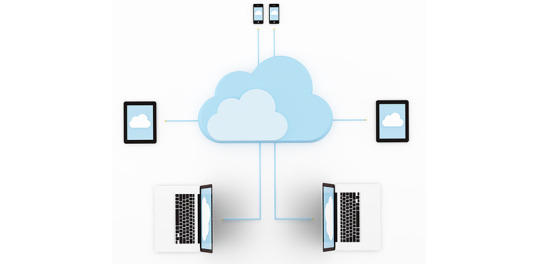
Cloud Computing is the most interesting and evolving topic in computing in the recent decade. The concept of storing data or accessing software from another computer that you are not aware of seems to be confusing to many users. Most the people/organizations that use cloud computing on their daily basis claim that they do not understand the subject of cloud computing. But the concept of cloud computing is not as confusing as it sounds. Cloud Computing is a type of service where the computer resources are sent over a network. In simple words, the concept of cloud computing can be compared to the electricity supply that we daily use. We do not have to bother how the electricity is made and transported to our houses or we do not have to worry from where the electricity is coming from, all we do is just use it. The ideology behind the cloud computing is also the same: People/organizations can simply use it. This concept is a huge and major development of the decade in computing.
Cloud computing is a service that is provided to the user who can sit in one location and remotely access the data or software or program applications from another location. Usually, this process is done with the use of a web browser over a network i.e., in most cases over the internet. Nowadays browsers and the internet are easily usable on almost all the devices that people are using these days. If the user wants to access a file in his device and does not have the necessary software to access that file, then the user would take the help of cloud computing to access that file with the help of the internet.
Cloud computing provide over hundreds and thousands of services and one of the most used services of cloud computing is the cloud storage. All these services are accessible to the public throughout the globe and they do not require to have the software on their devices. The general public can access and utilize these services from the cloud with the help of the internet. These services will be free to an extent and then later the users will be billed for further usage. Few of the well-known cloud services that are drop box, Sugar Sync, Amazon Cloud Drive, Google Docs etc.
Finally, that the use of cloud services is not guaranteed let it be because of the technical problems or because the services go out of business. The example they have used is about the Mega upload, a service that was banned and closed by the government of U.S and the FBI for their illegal file sharing allegations. And due to this, they had to delete all the files in their storage and due to which the customers cannot get their files back from the storage.
Service Models Cloud Software as a Service Use the provider's applications running on a cloud infrastructure Accessible from various client devices through thin client interface such as a web browser Consumer does not manage or control the underlying cloud infrastructure including network, servers, operating systems, storage
Google Apps, Microsoft Office 365, Petrosoft, Onlive, GT Nexus, Marketo, Casengo, TradeCard, Rally Software, Salesforce, ExactTarget and CallidusCloud
Cloud Platform as a Service Cloud providers deliver a computing platform, typically including operating system, programming language execution environment, database, and web server Application developers can develop and run their software solutions on a cloud platform without the cost and complexity of buying and managing the underlying hardware and software layers
AWS Elastic Beanstalk, Cloud Foundry, Heroku, Force.com, Engine Yard, Mendix, OpenShift, Google App Engine, AppScale, Windows Azure Cloud Services, OrangeScape and Jelastic.
Cloud Infrastructure as a Service Cloud provider offers processing, storage, networks, and other fundamental computing resources Consumer is able to deploy and run arbitrary software, which can include operating systems and applications Amazon EC2, Google Compute Engine, HP Cloud, Joyent, Linode, NaviSite, Rackspace, Windows Azure, ReadySpace Cloud Services, and Internap Agile
Deployment Models Private Cloud: Cloud infrastructure is operated solely for an organization Community Cloud : Shared by several organizations and supports a specific community that has shared concerns Public Cloud: Cloud infrastructure is made available to the general public Hybrid Cloud: Cloud infrastructure is a composition of two or more clouds
Advantages of Cloud Computing • Improved performance • Better performance for large programs • Unlimited storage capacity and computing power • Reduced software costs • Universal document access • Just computer with internet connection is required • Instant software updates • No need to pay for or download an upgrade
Disadvantages of Cloud Computing • Requires a constant Internet connection • Does not work well with low-speed connections • Even with a fast connection, web-based applications can sometimes be slower than accessing a similar software program on your desktop PC • Everything about the program, from the interface to the current document, has to be sent back and forth from your computer to the computers in the cloud
About Rang Technologies: Headquartered in New Jersey, Rang Technologies has dedicated over a decade delivering innovative solutions and best talent to help businesses get the most out of the latest technologies in their digital transformation journey. Read More...
#CloudComputing#CloudTech#HybridCloud#ArtificialIntelligence#MachineLearning#Rangtechnologies#Ranghealthcare#Ranglifesciences
9 notes
·
View notes
Text
What are Big Objects? And how is it solving the age-old Salesforce data storage problem?
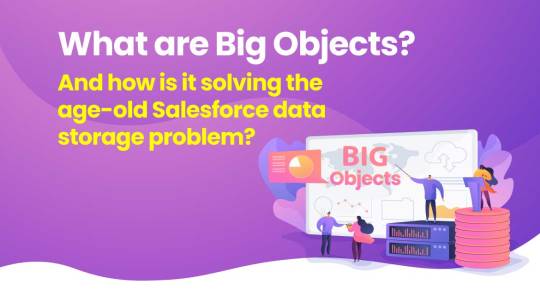
When Marc Benioff started Salesforce back in 1999, it was a typical CRM solution which could automate the sales process. Today, after almost two decades, Salesforce has become the world’s #1 CRM provider & offers a gamut of other cloud solutions. Innovation with the time and market adaptability has made Salesforce the market leader. They kept on adding new products and solutions along with their key acquisitions. Today if you see Salesforce’s gamut of offerings, they have got all the solutions which can help any business thrive by optimizing key business verticals and reducing operational costs. Read More
4 notes
·
View notes
Text
Unlocking Information Cloud Solutions: Powering Agile, Intelligent Enterprises

Introduction
In an era where data is the backbone of every organization, agility and intelligence are key to staying competitive. Businesses today need secure, scalable, and integrated solutions that break down silos and transform information into actionable insights. Information Cloud Solutions enable just that—offering a centralized ecosystem to manage, analyze, and act on data across departments, platforms, and geographies.
This blog explores the core capabilities of modern Information Cloud Solutions and how they empower enterprises to accelerate digital transformation, enhance collaboration, and make smarter decisions faster.
What Are Information Cloud Solutions?
Information Cloud Solutions are platforms that provide secure and scalable infrastructure for managing enterprise data and digital content in the cloud. They combine cloud storage, data integration, collaboration tools, and AI-powered analytics to deliver:
Unified access to structured and unstructured data
Intelligent data management and governance
Scalable collaboration across teams and locations
Integration with enterprise apps like ERP, CRM, and more
Advanced analytics and real-time insights
These platforms help businesses turn information into a strategic asset—ensuring that the right people have access to the right data at the right time.
Why Information Cloud Solutions Matter
In today’s digital-first economy, information overload is a real challenge. Without a centralized, intelligent cloud solution, organizations risk data duplication, security breaches, and operational inefficiencies. Information Cloud Solutions enable:
Seamless collaboration across departments and geographies
Enhanced decision-making with real-time data insights
Improved compliance, security, and control
Faster innovation cycles and product development
Greater agility to respond to market shifts
Core Capabilities of Information Cloud Solutions
Centralized Data Repository All enterprise data—whether from ERP, CRM, emails, or documents—is stored and managed in a single cloud environment. Benefit: Eliminates data silos and improves cross-functional collaboration.
Advanced Integration Capabilities Connect with popular enterprise tools such as Microsoft 365, Salesforce, SAP, and ServiceNow using APIs and integration hubs. Why it matters: Enables real-time data exchange and unified workflows.
AI-Powered Insights Leverage machine learning and natural language processing to extract insights, predict trends, and automate decisions. Pro Tip: Use AI to summarize documents, detect anomalies, and surface relevant content.
Robust Data Security & Compliance End-to-end encryption, role-based access, and compliance with standards like GDPR, HIPAA, and ISO. Outcome: Maintains trust, protects sensitive data, and ensures audit-readiness.
Low-Code Content Applications Develop custom apps for managing content lifecycles, approvals, and workflows without heavy coding. Result: Empowers teams to innovate without overburdening IT.
Scalable Cloud Infrastructure Elastic, cloud-native architecture that grows with your business. Why it helps: Ensures performance, availability, and cost-efficiency as demands scale.
Collaborative Workspaces Real-time editing, file sharing, and task management integrated into a single workspace. Tip: Enhance team productivity by bringing communication and content into one hub.
Real-World Use Cases of Information Cloud Solutions
🔹 Digital Content Management Organize, tag, and retrieve enterprise documents quickly across departments.
🔹 Product Development Collaboration Design, review, and iterate on product specs in a shared cloud workspace.
🔹 Regulatory Compliance Audits Automate data classification and access logs to streamline audit preparation.
Benefits of Information Cloud Solutions
Faster decision-making through centralized data access
Enhanced collaboration with unified content tools
Reduced IT costs with scalable cloud infrastructure
Stronger data governance and regulatory compliance
Customizable workflows through low-code tools
AI-powered automation and actionable insights
Future-Proofing Your Enterprise with Information Cloud
To stay resilient and competitive:
Invest in integration-friendly cloud platforms
Use AI to drive smarter information management
Train teams on using collaborative and analytics tools
Align cloud strategies with business growth goals
Continuously monitor usage and optimize performance
Conclusion
Information Cloud Solutions provide the digital foundation enterprises need to thrive in a fast-moving, data-driven world. By centralizing content, enabling real-time collaboration, and integrating intelligence into everyday workflows, these platforms empower businesses to innovate with speed and confidence.
At Prophecy Technologies, we help businesses leverage leading Information Cloud Solutions to build smarter workflows, foster collaboration, and unlock new business value—turning information into transformation.
0 notes
Text
How does cloud computing enable faster business scaling for me
Cloud Computing Market was valued at USD 605.3 billion in 2023 and is expected to reach USD 2619.2 billion by 2032, growing at a CAGR of 17.7% from 2024-2032.
Cloud Computing Market is witnessing unprecedented growth as businesses across sectors rapidly adopt digital infrastructure to boost agility, scalability, and cost-efficiency. From small startups to global enterprises, organizations are shifting workloads to the cloud to enhance productivity, improve collaboration, and ensure business continuity.
U.S. Market Leads Cloud Innovation with Expanding Enterprise Adoption
Cloud Computing Market continues to expand as emerging technologies such as AI, machine learning, and edge computing become more integrated into enterprise strategies. With increased reliance on hybrid and multi-cloud environments, providers are innovating faster to deliver seamless, secure, and flexible solutions.
Get Sample Copy of This Report: https://www.snsinsider.com/sample-request/2779
Market Keyplayers:
Amazon Web Services (AWS) (EC2, S3)
Microsoft (Azure Virtual Machines, Azure Storage)
Google Cloud (Google Compute Engine, Google Kubernetes Engine)
IBM (IBM Cloud Private, IBM Cloud Kubernetes Service)
Oracle (Oracle Cloud Infrastructure, Oracle Autonomous Database)
Alibaba Cloud (Elastic Compute Service, Object Storage Service)
Salesforce (Salesforce Sales Cloud, Salesforce Service Cloud)
SAP (SAP HANA Enterprise Cloud, SAP Business Technology Platform)
VMware (VMware vCloud, VMware Cloud on AWS)
Rackspace (Rackspace Cloud Servers, Rackspace Cloud Files)
Dell Technologies (VMware Cloud Foundation, Virtustream Enterprise Cloud)
Hewlett Packard Enterprise (HPE) (HPE GreenLake, HPE Helion)
Tencent Cloud (Tencent Cloud Compute, Tencent Cloud Object Storage)
Adobe (Adobe Creative Cloud, Adobe Document Cloud)
Red Hat (OpenShift, Red Hat Cloud Infrastructure)
Cisco Systems (Cisco Webex Cloud, Cisco Intersight)
Fujitsu (Fujitsu Cloud Service K5, Fujitsu Cloud IaaS Trusted Public S5)
Huawei (Huawei Cloud ECS, Huawei Cloud OBS)
Workday (Workday Human Capital Management, Workday Financial Management)
Market Analysis
The global cloud computing landscape is being redefined by increasing demand for on-demand IT services, software-as-a-service (SaaS) platforms, and data-intensive workloads. In the U.S., cloud adoption is accelerating due to widespread digital transformation initiatives and investments in advanced technologies. Europe is also experiencing significant growth, driven by data sovereignty concerns and regulatory frameworks like GDPR, which are encouraging localized cloud infrastructure development.
Market Trends
Surge in hybrid and multi-cloud deployments
Integration of AI and ML for intelligent workload management
Growth of edge computing reducing latency in critical applications
Expansion of industry-specific cloud solutions (e.g., healthcare, finance)
Emphasis on cybersecurity and compliance-ready infrastructure
Rise of serverless computing for agile development and scalability
Sustainability focus driving adoption of green data centers
Market Scope
Cloud computing's scope spans nearly every industry, supporting digital-first strategies, automation, and real-time analytics. Organizations are leveraging cloud platforms not just for storage, but as a foundation for innovation, resilience, and global expansion.
On-demand infrastructure scaling for startups and enterprises
Support for remote workforces with secure virtual environments
Cross-border collaboration powered by cloud-native tools
Cloud-based disaster recovery solutions
AI-as-a-Service and Data-as-a-Service models gaining traction
Regulatory-compliant cloud hosting driving European market growth
Forecast Outlook
The future of the Cloud Computing Market is driven by relentless demand for agile digital infrastructure. As cloud-native technologies become standard in enterprise IT strategies, both U.S. and European markets are expected to play pivotal roles. Advanced cloud security, integrated data services, and sustainability-focused infrastructure will be at the forefront of upcoming innovations. Strategic alliances between cloud providers and industry players will further fuel momentum, especially in AI, 5G, and IoT-powered environments.
Access Complete Report: https://www.snsinsider.com/reports/cloud-computing-market-2779
Conclusion
As the digital economy accelerates, the Cloud Computing Market stands at the core of modern enterprise transformation. It empowers businesses with the tools to scale intelligently, respond to market shifts rapidly, and innovate without limits. For leaders across the U.S. and Europe, embracing cloud technology is no longer optional—it's the strategic engine driving competitive advantage and sustainable growth.
Related Reports:
U.S.A drives innovation as Data Monetization Market gains momentum
U.S.A Wealth Management Platform Market Poised for Strategic Digital Transformation
U.S.A Trade Management Software Market Sees Surge Amid Cross-Border Trade Expansion
About Us:
SNS Insider is one of the leading market research and consulting agencies that dominates the market research industry globally. Our company's aim is to give clients the knowledge they require in order to function in changing circumstances. In order to give you current, accurate market data, consumer insights, and opinions so that you can make decisions with confidence, we employ a variety of techniques, including surveys, video talks, and focus groups around the world.
Contact Us:
Jagney Dave - Vice President of Client Engagement
Phone: +1-315 636 4242 (US) | +44- 20 3290 5010 (UK)
Mail us: [email protected]
0 notes
Text
What Is Cloud Computing? Benefits, Types, and Real-World Uses
In the digital age, cloud computing has revolutionized the way we store data, run applications, and do business. Whether you’re streaming a movie, sending an email, or managing a company’s IT infrastructure, chances are the cloud is involved.
But what exactly is cloud computing? And why is it so important? Let’s break it down in simple terms.
What Is Cloud Computing?
Cloud computing is the delivery of computing services—like servers, storage, databases, networking, software, and more—over the internet. Instead of buying and maintaining physical data centers and servers, you can access these resources on-demand from a cloud provider.
These providers include major players such as:
Amazon Web Services (AWS)
Microsoft Azure
Google Cloud Platform
IBM Cloud
Oracle Cloud
With cloud computing, you're essentially renting powerful computing resources rather than owning them, which gives you more flexibility and lower costs.
Benefits of Cloud Computing
Cloud computing offers several key advantages for individuals, startups, and large organizations alike:
1. Cost-Efficiency
You only pay for what you use. There’s no need to invest heavily in hardware or worry about ongoing maintenance costs.
2. Scalability
Easily scale your computing power up or down based on demand. Need more resources during a product launch? The cloud handles it instantly.
3. Remote Accessibility
With cloud services, your data and applications are accessible from any device, anywhere in the world, as long as there’s an internet connection.
4. Automatic Updates
Cloud providers take care of software and security updates, allowing you to focus on your core business.
5. Enhanced Security
Most cloud platforms offer built-in security features such as encryption, identity management, and compliance controls.
Types of Cloud Computing
There are three main service models in cloud computing:
IaaS (Infrastructure as a Service)
Provides virtualized computing resources over the internet. You manage everything except the physical hardware. Example: AWS EC2, Microsoft Azure VM
PaaS (Platform as a Service)
Offers a platform with tools to develop, test, and deploy applications without managing the underlying infrastructure. Example: Google App Engine, Heroku
SaaS (Software as a Service)
Delivers software applications over the internet, usually on a subscription basis. Example: Google Workspace, Dropbox, Salesforce
Real-World Applications
Cloud computing is everywhere, whether you notice it or not. Here are a few common use cases:
Businesses host websites, run apps, and manage customer data in the cloud.
Developers deploy and scale applications quickly using cloud platforms.
Remote teams collaborate in real time using cloud-based tools like Microsoft 365 and Zoom.
Data scientists use the cloud to store and analyze massive datasets efficiently.
Why Cloud Computing Matters
Cloud computing isn’t just a trend—it’s the foundation of modern technology. It empowers individuals, startups, and enterprises to innovate, grow, and adapt in a fast-changing world.
Whether you're launching a new app, managing a global team, or simply storing photos, the cloud provides a flexible, secure, and cost-effective solution.
Final Thoughts
Cloud computing has transformed the digital landscape, making powerful tools and services accessible to everyone. Understanding how it works and what it can do isn’t just useful—it’s essential.
Whether you’re a student, entrepreneur, or IT professional, embracing the cloud opens up new possibilities and ensures you’re ready for the future of technology.
1 note
·
View note
Text
How Power BI Solutions Support Data-Driven Digital Transformation

In the era of rapid technological advancement, businesses are increasingly turning to data-driven strategies to remain competitive, agile, and customer-focused. Digital transformation has emerged as a vital objective across industries—from manufacturing to healthcare, retail to finance. A core enabler of this transformation is business intelligence (BI), and among the most effective tools available today is the Power BI solution from Microsoft.
What Is Digital Transformation?
Digital transformation refers to the strategic integration of digital technologies into all areas of a business. It goes beyond simply digitizing processes—it involves rethinking business models, customer engagement, operations, and internal workflows with a focus on innovation, efficiency, and scalability.
A Power BI solution plays a key role in this transformation by offering organizations the ability to collect, analyze, and visualize data in real time, turning raw data into actionable intelligence.
Power BI: The Catalyst for a Data-Driven Culture
1. Unified Data Access Across the Organization
One of the biggest challenges in digital transformation is breaking down data silos. Data often resides in disparate systems—CRM, ERP, cloud storage, spreadsheets, and databases—making it difficult to consolidate for analysis.
A Power BI solution seamlessly integrates with hundreds of data sources, including Microsoft Azure, SQL Server, Google Analytics, Salesforce, SAP, and more. This allows businesses to bring together scattered data into a unified view, laying the foundation for strategic decision-making.
2. Real-Time Insights for Agile Decision-Making
Digital transformation thrives on speed and responsiveness. Power BI enables real-time analytics and live dashboards that reflect the most up-to-date metrics across operations, finance, marketing, and sales. These real-time insights empower teams to respond proactively to market shifts, customer behavior changes, and internal inefficiencies.
For instance, a retailer can track live inventory levels and sales data, allowing immediate adjustments to promotions or supply chain decisions. A Power BI solution eliminates guesswork and replaces it with data-backed responsiveness.
Transforming Business Functions with Power BI
1. Finance and Operations
Power BI simplifies complex financial data into visual dashboards that highlight performance metrics like revenue trends, cost optimization, and cash flow. Finance teams gain transparency and can perform deeper analysis with predictive models and historical comparisons.
In operations, Power BI improves process visibility by tracking KPIs such as production efficiency, resource utilization, and turnaround times—enabling lean, optimized workflows.
2. Sales and Marketing
Sales teams use Power BI dashboards to monitor pipelines, lead conversions, territory performance, and customer lifetime value. Marketing teams benefit from campaign analytics, ROI tracking, and customer engagement trends.
With a Power BI solution, both departments align more closely with real-time performance indicators, leading to faster strategy pivots and higher ROI.
3. Human Resources and Employee Engagement
HR departments leverage Power BI to monitor headcount, employee satisfaction, hiring trends, and attrition rates. This data aids in workforce planning, talent management, and organizational health assessments.
Supporting Predictive and Prescriptive Analytics
True digital transformation requires organizations to move from descriptive analytics (what happened) to predictive (what will happen) and prescriptive (what should be done). Power BI integrates with advanced analytics tools such as Azure Machine Learning and R or Python scripts.
This allows companies to build and visualize predictive models directly within their dashboards, such as forecasting sales, identifying churn risks, or optimizing resource allocation. A Power BI solution turns BI from a reactive tool into a proactive strategic asset.
Enabling a Culture of Data-Driven Decision-Making
For digital transformation to be successful, data accessibility must extend beyond the executive level. Power BI promotes the democratization of data, meaning that employees across all levels can access and interact with business intelligence relevant to their role.
With user-friendly interfaces, drag-and-drop visuals, and natural language queries, a Power BI solution empowers non-technical users to explore data, generate reports, and derive their own insights, fostering a culture where decisions are based on facts, not assumptions.
Enhancing Collaboration and Communication
Power BI seamlessly integrates with Microsoft Teams, SharePoint, and other collaboration tools, allowing cross-functional teams to share dashboards, tag team members in reports, and jointly explore data. This alignment of insights promotes collaboration and accelerates collective problem-solving.
Furthermore, automated alerts and scheduled reports keep stakeholders informed without requiring manual intervention, reinforcing transparency and communication.
Scalability and Governance
As businesses grow and their data expands, maintaining governance and data security becomes essential. Power BI offers robust governance features, including role-based access control, row-level security, activity monitoring, and compliance with industry standards like GDPR and HIPAA.
Whether deployed in a small team or across a global enterprise, a Power BI solution scales with the organization while maintaining high standards of governance.
Real-World Example
A healthcare provider undergoing digital transformation adopted a Power BI solution to consolidate patient records, monitor treatment efficiency, and track hospital performance. Within months, the organization reported:
30% improvement in patient throughput
Faster identification of care bottlenecks
Enhanced reporting for regulatory compliance
This transformation not only improved operations but also elevated patient care standards.
Conclusion
Digital transformation isn’t a one-time event—it’s a continuous evolution driven by technology, data, and a commitment to innovation. Microsoft’s Power BI solution acts as a strategic enabler in this journey by providing real-time visibility, actionable insights, and predictive capabilities.
Whether you're modernizing your business model, improving customer experiences, or optimizing internal processes, Power BI is a powerful ally in turning digital aspirations into measurable outcomes. For organizations serious about data-driven transformation, investing in a Power BI solution is a forward-looking and necessary step.
0 notes
Text
Nonprofit Case Management Tool: Streamlining Services, Strengthening Impact
Nonprofits play a vital role in supporting communities — whether it’s helping families in crisis, housing individuals experiencing homelessness, supporting survivors of abuse, or mentoring at-risk youth. These organizations handle complex cases, often under tight budgets and with limited staff. That’s where a nonrpfoit case management tool becomes not just helpful, but essential.
Designed specifically for the unique needs of human services and social impact work, a nonprofit case management tool allows organizations to centralize client data, streamline workflows, and report on outcomes — all while maintaining the flexibility and security needed for sensitive, high-touch work.
What Is a Nonprofit Case Management Tool?
A nonprofit case management tool is a software platform that helps organizations manage client interactions, track services, measure progress, and maintain accurate records — all in one place.
Unlike generic customer relationship management (CRM) tools or spreadsheets, nonprofit case management tools are built for mission-driven work, with features designed to support human-centered services, collaboration, and outcome measurement.
Key Features and Functions
1. Centralized Client Records
Track everything in one system — from initial intake to final outcomes. Store demographics, case notes, service history, and documents in a secure, centralized database accessible by authorized staff.
2. Customizable Workflows
Every nonprofit is different. A good case management tool allows you to configure workflows, forms, and service tracking to fit your specific programs and reporting needs.
3. Outcome and Impact Tracking
Measure what matters. Whether you’re tracking housing stability, employment, educational progress, or mental health improvement, these tools help you define and monitor key outcomes.
4. Integrated Reporting
Generate reports for funders, boards, and grantors with just a few clicks. Build custom dashboards to visualize your organization’s performance in real time.
5. Secure, Role-Based Access
Ensure data privacy and compliance (such as HIPAA or GDPR) with encrypted storage, user permissions, and audit trails.
6. Collaboration and Notes
Allow multiple caseworkers, volunteers, or departments to collaborate on cases, log notes, and share updates — ensuring continuity of care.
Benefits for Nonprofits
Who Can Benefit?
This tool is ideal for a wide range of mission-driven organizations, including:
Homeless shelters and housing programs
Food banks and community outreach centers
Domestic violence and crisis response organizations
Youth and mentoring programs
Reentry and workforce development programs
Behavioral health and substance use recovery providers
Popular Nonprofit Case Management Tools
Some of the most widely used platforms in the nonprofit space include:
Apricot by Bonterra – Known for flexibility and strong outcome tracking.
CaseWorthy – Great for multi-program, data-driven organizations.
ETO (Efforts to Outcomes) – Focuses on performance and impact.
Penelope by Athena Software – Designed for complex, long-term case management.
Salesforce Nonprofit Cloud – Highly customizable, with case management modules.
Final Thoughts
A nonprofit case management tool is more than a digital filing system — it’s a central hub that empowers your team to work smarter, serve more people, and demonstrate your mission’s true impact. In a field where every resource and every moment matters, the right tool can make all the difference.
0 notes
Text
What Is a Cloud Solution?

In today’s dynamic digital environment, cloud solutions have become the backbone of modern enterprise technology. As organizations continue to transition away from traditional IT infrastructure, the demand for scalable, flexible, and efficient computing has pushed cloud-based services to the forefront. But what exactly is a cloud solution, and why has it become so essential for businesses of all sizes?
Understanding the Fundamentals of a Cloud Solution
A cloud solution refers to any on-demand service, application, or resource that is delivered via the internet. Unlike traditional computing, which relies on physical servers and local infrastructure, cloud computing enables users to access technology services—such as storage, networking, software, analytics, and intelligence—remotely through a cloud provider.
These solutions are typically hosted in data centers and offered through providers like Amazon Web Services (AWS), Microsoft Azure, Google Cloud Platform (GCP), and others. They provide seamless access, cost efficiency, and powerful processing capabilities that are far superior to legacy systems.
Types of Cloud Solutions
To fully understand what a cloud solution entails, it’s crucial to explore its different deployment and service models:
Public Cloud
A public cloud is a cloud environment owned and operated by a third-party provider. These services are delivered over the internet and shared across multiple organizations. Examples include AWS, Azure, and GCP. Public cloud solutions are ideal for businesses that want to eliminate the cost of hardware purchases and reduce IT complexity.
Private Cloud
A private cloud is dedicated to a single organization and can be hosted either on-premises or through a third-party service. It offers enhanced control, security, and customization. Enterprises with strict compliance requirements often opt for private cloud environments.
Hybrid Cloud
A hybrid cloud combines both public and private clouds, allowing data and applications to be shared between them. This model provides flexibility, scalability, and better deployment options while meeting both operational and regulatory needs.
Multi-Cloud
Multi-cloud refers to the use of more than one cloud service provider. Businesses adopt this strategy to avoid vendor lock-in, increase resilience, and optimize workloads based on performance, cost, and location.
Cloud Service Models
There are three primary cloud service models:
Infrastructure as a Service (IaaS)
IaaS delivers fundamental IT resources such as virtual machines, storage, and networking through the internet. Businesses can scale up or down based on demand. It eliminates the need to invest in physical hardware, making it a popular choice for startups and enterprises alike.
Platform as a Service (PaaS)
PaaS provides a framework for developers to build and deploy applications without managing the underlying infrastructure. It includes tools, libraries, and development environments, enhancing productivity and innovation.
Software as a Service (SaaS)
SaaS offers ready-to-use applications accessible through a web browser. Common examples include Microsoft 365, Salesforce, Dropbox, and Google Workspace. SaaS eliminates the need for installation, maintenance, and upgrades, delivering a seamless experience to end-users.
Benefits of Cloud Solutions
Embracing cloud solutions provides a multitude of benefits that empower businesses to operate more efficiently and competitively.
1. Scalability and Flexibility
Cloud services allow organizations to scale resources up or down based on real-time demands. Whether it’s increasing storage capacity or deploying new applications, everything is done instantly without physical constraints.
2. Cost Efficiency
One of the most attractive advantages of cloud computing is its pay-as-you-go model. Companies only pay for what they use, eliminating the high capital expenditures associated with traditional IT.
3. Business Continuity
Cloud providers offer robust disaster recovery and backup solutions. In the event of a failure, data can be quickly restored, ensuring minimal downtime and business continuity.
4. Enhanced Collaboration
Cloud platforms enable real-time collaboration among teams, regardless of their physical location. File sharing, communication tools, and synchronized data ensure that everyone is working with the most current information.
5. Automatic Updates and Maintenance
Providers manage the underlying infrastructure, including software updates and security patches. This ensures that businesses always have access to the latest features and protections without manual intervention.
6. Security and Compliance
Leading cloud providers invest heavily in security, including encryption, threat detection, and compliance certifications (e.g., GDPR, HIPAA, ISO 27001). While concerns still exist, many cloud environments offer superior protection compared to on-premise systems.
Key Use Cases of Cloud Solutions
Cloud solutions serve as the foundation for numerous modern applications and services:
Data Storage & Backup: Secure, scalable cloud storage for large volumes of structured and unstructured data.
Big Data Analytics: Process massive datasets quickly with AI and ML-powered analytics platforms.
Web Hosting: Flexible and reliable hosting services with global reach and redundancy.
Application Development: Cloud-based development environments enhance speed and reduce time to market.
E-commerce: Powering online stores with scalability during peak seasons and integrated payment systems.
Remote Work: Enabling a distributed workforce with access to tools and files anytime, anywhere.
Challenges and Considerations in Cloud Adoption
While cloud solutions offer numerous advantages, there are some challenges businesses must address:
Data Security and Privacy
Data stored in the cloud can be vulnerable to breaches if not adequately secured. Organizations must implement encryption, access control, and security policies to protect sensitive information.
Compliance Requirements
Industries such as finance and healthcare have strict data regulations. Choosing a cloud provider that supports relevant compliance standards is essential.
Latency and Downtime
Although rare, outages do occur. Businesses should assess service level agreements (SLAs) and build redundancy into their cloud architecture.
Vendor Lock-in
Dependence on a single cloud provider can limit flexibility. A multi-cloud strategy may help mitigate this risk.
Future of Cloud Solutions
The future of cloud computing is incredibly promising, driven by advancements in AI, machine learning, edge computing, and quantum computing. Businesses are investing in cloud-native architectures, leveraging microservices, containers, and serverless computing to enhance performance and agility.
As 5G technology matures, the integration of IoT and edge cloud will revolutionize industries such as manufacturing, healthcare, and logistics by enabling real-time processing closer to data sources.
Conclusion
A cloud solution is far more than just a buzzword—it is a transformative technology that is reshaping the digital landscape. From cost efficiency and agility to security and innovation, cloud computing empowers businesses to thrive in a competitive market. Whether you're a startup looking to scale or an enterprise seeking digital transformation, adopting the right cloud strategy can unlock unparalleled growth.
1 note
·
View note
Text
Digital Signature Online: The Complete Compliance & Security Checklist
In today’s fast-paced digital world, signing documents online has become the new norm. Whether you're closing a business deal, onboarding a client, or signing a legal agreement, the shift to digital signatures online isn’t just about convenience—it’s about trust, compliance, and security.
But here’s the catch: Not all digital signature solutions are created equal. To protect your business, maintain legal integrity, and avoid costly mistakes, you need a reliable digital signature platform that ticks all the right boxes.
Let’s walk you through a complete compliance and security checklist every business should follow when choosing a digital signature solution.
✅ Why Compliance & Security Matter for Digital Signatures Online
A digital signature online is more than just typing your name or dragging and dropping an image—it’s a legally binding, encrypted, and verifiable method of signing documents. And that means:
You’re accountable for every signature.
Your data must remain secure and traceable.
Your platform needs to comply with international and local laws.
⚠️ One small mistake can invalidate a contract or expose you to data breaches.
That’s why choosing a compliant and secure platform like Signit Online is critical.
🛡️ The Ultimate Compliance & Security Checklist for Digital Signatures Online
When evaluating a digital signature solution, use this checklist to ensure your business is fully protected and legally covered.
1. Legal Validity & Global Compliance
Ensure the platform complies with leading digital signature laws, such as:
eIDAS (EU)
ESIGN Act & UETA (USA)
UK Electronic Communications Act
✅ Signit Online is eIDAS-compliant, ensuring full legal recognition in the UK and EU.
2. End-to-End Encryption
Documents and signatures should be encrypted using advanced cryptographic methods like:
AES-256 Bit Encryption
Secure Socket Layer (SSL)
Public Key Infrastructure (PKI)
🔐 Look for platforms that protect both data in transit and at rest.
3. Audit Trails & Timestamping
A secure digital signature should include a full audit trail with:
Signer IP address
Time and date stamps
Authentication method used
Document version history
📝 Signit Online provides detailed audit logs for every transaction—perfect for legal or regulatory scrutiny.
4. Multi-Factor Authentication (MFA)
Enhance signer verification through:
SMS/email OTPs
Biometric verification (if available)
ID validation integrations
This ensures that only the intended person can sign the document.
5. User Access Controls
Control who can view, sign, or edit a document with:
Role-based permissions
Document expiration settings
Access revocation tools
🛠️ Protect sensitive data with fine-grained user control.
6. Data Residency & Storage Security
Check where your documents are stored and whether the platform:
Hosts data in UK/EU servers (for GDPR compliance)
Offers secure cloud-based or on-premises storage
Performs regular data backups
7. Integration & API Access
For growing teams, choose platforms that integrate seamlessly with:
CRM tools (e.g., Salesforce, HubSpot)
Cloud storage (e.g., Google Drive, OneDrive)
Business apps via secure APIs
⚙️ Signit Online offers enterprise-grade integrations for scalable workflows.
8. Document Integrity Protection
Ensure signed documents are tamper-evident. If someone tries to change the content after signing, the system should:
Invalidate the signature
Flag the tampering
Notify all parties involved
💼 Real-World Use Cases
Who needs this checklist the most?
Legal firms ensuring contract enforceability
HR teams onboarding remote hires
Sales reps sending out proposals and quotes
Finance departments managing vendor agreements
Small business owners securing digital workflows
🚀 Why Choose Signit Online for Secure Digital Signatures?
Signit Online is built with compliance-first architecture, top-tier security, and user-friendly tools that make signing documents fast, safe, and stress-free.
💡 Key Features:
Fully compliant with eIDAS and UK regulations
Bank-level encryption & MFA
Detailed audit trails
GDPR-ready data residency in the UK
API integrations and scalable plans
💬 “We switched to Signit Online and cut our document turnaround time by 70%. The security gives us peace of mind, and the platform is incredibly easy to use.” – A UK Legal Consultant
📝 Final Thoughts: Secure, Compliant, and Ready for Business
The shift to digital signatures online isn’t just a trend—it’s a strategic advantage. But only if you choose a platform that’s secure, legally valid, and scalable.
Before your next document goes out, double-check it against this compliance & security checklist—and trust your signatures to a platform like Signit Online that puts your safety and success first.
📣 Ready to Secure Your Digital Workflow?
👉 Try Signit Online for Free Today 👉 Schedule a Demo and see it in action 👉 Explore Pricing Plans tailored to your business size
#sign documents online#online signature#digital signature online#electronic signature#e signature#digitally sign pdf#online document signing
0 notes
Text
Expert CRM Developers in London – Custom CRM Solutions for Your Business
Customer Relationship Management (CRM) systems have become indispensable tools for businesses aiming to streamline operations, enhance customer interactions, and drive growth. In London, a global hub for commerce and innovation, expert CRM developers London play a pivotal role in designing and implementing tailored CRM solutions that align with unique business needs. Whether you operate in finance, retail, healthcare, or any other sector, leveraging custom CRM software can significantly improve efficiency, customer satisfaction, and profitability.
The Importance of CRM Systems in Modern Business
CRM systems serve as centralized platforms for managing customer data, interactions, and sales pipelines. They enable businesses to track leads, automate marketing campaigns, and analyze customer behavior to make data-driven decisions. A well-implemented CRM system fosters stronger relationships with clients, reduces administrative burdens, and enhances collaboration across teams.
For businesses in London, where competition is fierce and customer expectations are high, investing in a CRM system is no longer optional—it’s a necessity. Off-the-shelf CRM solutions may offer basic functionalities, but they often lack the flexibility required to address industry-specific challenges. This is where expert CRM developers come into play, crafting bespoke solutions that cater to precise business requirements.
Why Choose Custom CRM Solutions?
1. Tailored to Your Business Needs Generic CRM platforms may not align with your workflows, industry regulations, or scalability demands. Custom CRM solutions are built from the ground up to accommodate your business processes, ensuring seamless integration with existing tools and systems.
2. Enhanced Efficiency and Automation Expert CRM developers design automation features that eliminate repetitive tasks, such as data entry, follow-ups, and report generation. This allows your team to focus on strategic initiatives rather than administrative work.
3. Scalability for Future Growth As your business expands, your CRM system should evolve with it. Custom solutions are designed with scalability in mind, ensuring they can handle increased workloads, additional users, and new functionalities without performance bottlenecks.
4. Improved Data Security and Compliance London-based businesses, particularly those in finance and healthcare, must adhere to strict data protection regulations like GDPR. Custom CRM systems incorporate robust security measures, including encryption, access controls, and audit trails, to safeguard sensitive customer information.
5. Seamless Integration with Existing Tools A bespoke CRM can integrate effortlessly with your ERP, marketing automation, and accounting software, creating a unified ecosystem that enhances productivity and data accuracy.
Key Features of a Custom CRM System
A well-designed CRM solution includes the following core features:
- Contact and Lead Management – Centralized storage of customer details, interaction history, and lead tracking. - Sales Pipeline Management – Visual dashboards to monitor deals, forecast revenue, and identify bottlenecks. - Marketing Automation – Tools for email campaigns, social media integration, and customer segmentation. - Customer Support Ticketing – Streamlined issue resolution with automated ticket assignment and tracking. - Analytics and Reporting – Real-time insights into sales performance, customer behavior, and ROI. - Mobile Accessibility – Cloud-based access from any device, enabling remote work and on-the-go updates.
The Role of Expert CRM Developers in London
London boasts a thriving tech ecosystem with highly skilled CRM developers who specialize in creating sophisticated, industry-specific solutions. These professionals bring a wealth of expertise in:
- CRM Platforms – Proficiency in leading CRM frameworks such as Salesforce, Microsoft Dynamics, HubSpot, and custom-built solutions. - Programming Languages – Expertise in Python, PHP, JavaScript, and .NET for backend and frontend development. - API Integrations – Seamless connectivity with third-party applications like payment gateways, ERP systems, and marketing tools. - UI/UX Design – Intuitive interfaces that enhance user adoption and minimize training time. - Data Migration – Smooth transition from legacy systems to new CRM platforms without data loss.
Industries Benefiting from Custom CRM Solutions
1. Financial Services Banks, insurance firms, and investment companies rely on CRM systems to manage client portfolios, compliance tracking, and risk assessment. Custom CRMs ensure secure handling of sensitive financial data while automating client onboarding and reporting.
2. Retail and E-Commerce CRM solutions help retailers personalize customer experiences, manage loyalty programs, and optimize inventory based on purchasing trends. Integration with e-commerce platforms like Shopify or Magento enhances order processing and customer engagement.
3. Healthcare Medical institutions use CRMs to manage patient records, appointment scheduling, and billing. Custom solutions ensure HIPAA/GDPR compliance while improving patient communication and care coordination.
4. Real Estate Agents and property developers leverage CRMs to track leads, manage listings, and automate follow-ups. Features like virtual tours and document management streamline transactions.
5. Professional Services Law firms, consultancies, and marketing agencies use CRMs to track billable hours, client communications, and project milestones, improving efficiency and client retention.
Choosing the Right CRM Development Partner in London
Selecting an experienced CRM developer is crucial for the success of your project. Consider the following factors:
- Portfolio and Case Studies – Review past projects to assess expertise in your industry. - Technical Proficiency – Ensure the team is skilled in the latest CRM technologies and integrations. - Client Testimonials – Feedback from previous clients provides insights into reliability and service quality. - Post-Deployment Support – Ongoing maintenance, updates, and troubleshooting are essential for long-term success.
The Future of CRM Development
Advancements in artificial intelligence (AI), machine learning, and predictive analytics are transforming CRM systems. Future trends include:
- AI-Powered Insights – Predictive analytics for customer behavior and sales forecasting. - Voice and Chatbot Integration – Enhanced customer support via AI-driven assistants. - Blockchain for Security – Decentralized data storage to prevent breaches. - Hyper-Personalization – AI-driven recommendations tailored to individual customer preferences.
Conclusion
Investing in a custom CRM solution developed by experts in London can revolutionize your business operations, customer engagement, and revenue growth. By partnering with skilled developers, you gain a competitive edge through a system designed specifically for your needs, ensuring scalability, security, and seamless integration. In a dynamic business landscape, a tailored CRM is not just a tool—it’s a strategic asset that drives long-term success.
#application development#application development london#crm developers london#bespoke software development
0 notes
Text
Key Features of Our OCR & Intelligent Document Processing Solution

In today’s fast-paced digital world, businesses deal with massive volumes of documents daily—invoices, contracts, receipts, and forms—that require accurate and efficient processing. Traditional manual data entry is time-consuming, error-prone, and costly. This is where an Intelligent Document Processing Solution powered by Optical Character Recognition (OCR) and Artificial Intelligence (AI) comes into play.
At GlobalNodes, we provide a cutting-edge Intelligent Document Processing Solution that automates data extraction, classification, and validation, helping businesses streamline workflows, reduce errors, and improve productivity.
In this blog, we’ll explore the key features of our OCR & Intelligent Document Processing Solution, how it works, and why it’s a game-changer for industries like finance, healthcare, logistics, and legal services.
What Is an Intelligent Document Processing Solution?
An Intelligent Document Processing Solution combines OCR, AI, and machine learning (ML) to automatically capture, classify, and extract data from structured and unstructured documents. Unlike traditional OCR, which only converts scanned text into digital format, an AI-powered document processing system understands context, validates data, and integrates seamlessly with business applications.
Why Businesses Need It
✔ Eliminates manual data entry – Reduces human errors and processing time. ✔ Improves compliance & accuracy – Ensures data consistency and regulatory adherence. ✔ Enhances operational efficiency – Automates workflows for faster decision-making. ✔ Scales with business growth – Handles increasing document volumes effortlessly.
Key Features of Our Intelligent Document Processing Solution
Our Intelligent Document Processing Solution is designed to handle diverse document types with high accuracy. Here are its standout features:
1. Advanced OCR with AI-Powered Text Recognition
Our solution uses AI-enhanced OCR to accurately extract text from scanned documents, handwritten notes, PDFs, and images. Unlike basic OCR, it: ✔ Supports multiple languages and fonts✔ Reads handwritten text with high precision✔ Processes low-quality scans and distorted documents
2. Smart Document Classification & Sorting
Not all documents are the same—invoices, contracts, and IDs require different handling. Our Intelligent Document Processing Solution automatically: ✔ Classifies documents (e.g., invoices vs. receipts) ✔ Routes them to the correct workflow✔ Identifies key fields (dates, amounts, vendor names)
3. Context-Aware Data Extraction
Traditional OCR extracts raw text, but our AI-driven solution understands context, such as: ✔ Invoice numbers & payment terms✔ Customer names & addresses✔ Contract clauses & key datesThis reduces manual corrections and speeds up processing.
4. Automated Data Validation & Error Correction
Mistakes in data entry can be costly. Our system: ✔ Cross-checks extracted data with existing databases ✔ Flags inconsistencies (e.g., mismatched invoice amounts) ✔ Suggests corrections using AI-powered validation
5. Seamless Integration with Business Systems
Our Intelligent Document Processing Solution integrates with: ✔ ERP systems (SAP, Oracle, QuickBooks)✔ Cloud storage (Google Drive, SharePoint, Dropbox)✔ CRM platforms (Salesforce, HubSpot)This ensures smooth data flow across departments.
6. AI-Powered Fraud Detection
For industries like banking and insurance, detecting fraudulent documents is critical. Our solution: ✔ Identifies forged signatures & tampered documents✔ Checks for duplicate invoices & fake IDs✔ Alerts compliance teams in real-time
7. Scalable & Cloud-Ready Deployment
Whether you need on-premise, cloud, or hybrid solutions, our system scales to meet your needs. Benefits include: ✔ High-volume processing (thousands of documents per hour) ✔ Secure cloud storage with encryption✔ API access for custom workflows
8. Customizable Workflow Automation
Every business has unique document workflows. Our solution allows: ✔ Rule-based automation (e.g., auto-approve invoices under $1,000) ✔ Human-in-the-loop validation for complex cases ✔ Custom reporting & analytics dashboards
9. Compliance & Audit Trail
For industries with strict regulations (GDPR, HIPAA, SOX), our solution provides: ✔ Full audit logs of document processing ✔ Role-based access control✔ Secure data redaction for sensitive information
10. Real-Time Analytics & Insights
Beyond extraction, our Intelligent Document Processing Solution offers: ✔ Trend analysis (e.g., peak invoice processing times) ✔ Performance metrics (accuracy rates, processing speed) ✔ Predictive analytics to optimize workflows
Industries That Benefit from Our Intelligent Document Processing Solution
🏦 Banking & Finance
✔ Automates loan applications & KYC verification ✔ Detects fraudulent transactions
🏥 Healthcare
✔ Processes patient records & insurance claims ✔ Ensures HIPAA compliance
📦 Logistics & Supply Chain
✔ Automates shipping labels & customs forms ✔ Tracks inventory via purchase orders
⚖ Legal & Compliance
✔ Extracts clauses from contracts ✔ Manages case files efficiently
📑 Government & Public Sector
✔ Digitizes citizen records ✔ Automates permit & license processing
Why Choose GlobalNodes’ Intelligent Document Processing Solution?
✅ Higher Accuracy – AI reduces errors compared to manual entry. ✅ Faster Processing – Cuts document handling time by 80% or more. ✅ Cost Savings – Reduces labor costs and operational overhead. ✅ Security & Compliance – Ensures data privacy and regulatory adherence.
Final Thoughts
Manual document processing is no longer sustainable in the digital age. Our Intelligent Document Processing Solution leverages OCR, AI, and automation to transform how businesses handle documents—improving speed, accuracy, and efficiency.Whether you’re in finance, healthcare, logistics, or legal services, our solution can be tailored to your needs
0 notes